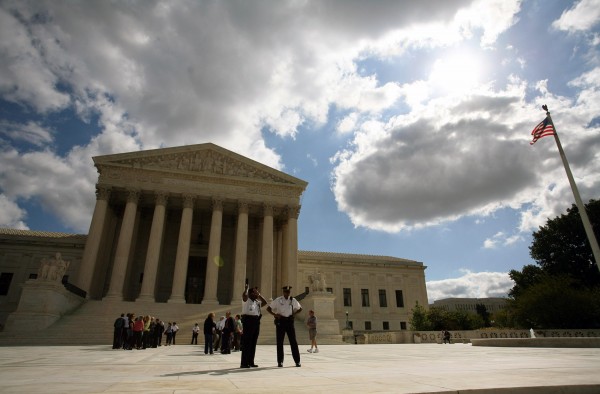By Bruce Kaufman, Bloomberg BNA
The House is poised to pass three bills this week championed by industry that may tilt the civil litigation process in favor of business in thousands of cases each year.
Business groups are encouraged about the measures’ chances of eventual enactment. That’s because the House is not only taking up the far-reaching bills addressing class actions, asbestos cases and attorneys who file “frivolous” suits, but it is doing so at rapid speed.
The fast-track approach is deemed essential to give the bills time to advance in the more-deliberative Senate, where 60 votes are needed to overcome an almost certain filibuster.
The bills, derided by consumer groups and plaintiffs’ attorneys, make changes large and small to class actions and other important devices that shape the modern civil litigation process.
The bills have passed before in the House, but faced a certain veto under then-President Barack Obama. President Donald Trump is seen as likely to sign the measures into law, if they reach his desk.
Final Debate
The legislation, set for final debate and votes March 9 and 10, rewrites class-action practice, aids defendants striving to keep cases out of plaintiff-friendly state courts, and punishes attorneys who file dubious claims.
They also seek to put new limits on settlements entered into by the Department of Justice and the EPA , and require more disclosures by asbestos victims who seek compensation from bankruptcy trusts.
Pressure by opponents of litigation reform, including scores of consumer groups, labor and civil rights organizations, and academics, may already be taking a toll on some of the most far-reaching provisions.
In the case of the class action bill (HR 985), an amendment by sponsor Rep. Bob Goodlatte (R-Va.), the chairman of the House Judiciary Committee, limits the bill’s reach into one area of the
law: securities.
Goodlatte’s amendment addresses concerns that the bill will have unintended consequences for cases already covered by the Private Securities Litigation Reform Act of 1995. The amendment would carve out private securities class actions from sections covering conflicts of interest and stays of discovery.
Meanwhile, opponents are hoping for close votes on the house floor in a bid to discourage rapid Senate action.
Paul Bland, executive director of Public Justice in Washington, told Bloomberg BNA that if the Republicans “do not have near unanimity in the House, the chances of success in the Senate drop sharply.”
“Several Senate Republicans have been historically far more reluctant to tinker with or undermine the civil justice system than their House counterparts,” Bland said, “If more than a dozen House Republicans vote against the tort reform bills, they’re likely to be toast,” he said.
Victor Schwartz, a partner at Shook, Hardy & Bacon in Washington and a long-time advocate for the bills, told Bloomberg BNA that supporters will use the House floor debate as a “learning experience” to find out if opponents are unveiling new arguments against the bills.
What to Look For?
With House passage almost certain, opponents and supporters are already turning an eye toward the more difficult path ahead in the Senate.
Bland, an opponent, said the final tallies will be significant because of the implications for what happens in the upper chamber.
“If the Republicans lose any substantial number of members in the House, there’s a significant chance” that Senate Majority Leader Mitch McConnell (R-Ky) will “not want to waste much floor time on the bills,” he said.
“The Senate Republicans may move them enough for fund-raising purposes, to milk the base, but it’s hard to see Senator McConnell spending much floor time on bills that won’t have a high chance of passage,” he said.
But Darren McKinney, communications director for the American Tort Reform Association, a proponent for the bills, advised against broad interpretation of the final votes.
“We’d be surprised if any of these bills fail to pass the House,” he told Bloomberg BNA.
“But House passage is no real predictor of strength or likely strategies in the Senate where the GOP may need to woo up to 10 or so Democrats to overcome the 60-vote barrier,” he said.
The three measures set for final debate in the House are:
• The Fairness in Class Action Litigation Act (H.R. 985), which impacts nearly all facets of class action practice. The bill also now contains the text of former H.R. 906, the Furthering Asbestos Claims Transparency Act, which mandates increased reporting of payments to plaintiffs by trusts that pay out asbestos exposure claims against bankrupt companies.
• The Innocent Party Protection Act (H.R. 725) targets what is known as fraudulent joinder — the improper addition of defendants to suits in a bid to keep cases in more plaintiff-friendly state courts.
• The Lawsuit Abuse Reduction Act (H.R. 720) requires judges to impose mandatory sanctions on attorneys who file “meritless”
civil cases in federal courts.
More Bills on Tap
Three additional bills that impact civil litigation are expected to pass in the House at a later date, perhaps as early as the week of March 13.
Two of the bills, the Stop Settlement Slush Funds Act (HR 732) and the Protecting Access to Care Act (H.R. 1215), have already made their way to the House floor.
HR 732 bars certain federal agencies from entering into settlements that steer funds to favored third-party groups. HR 1215 caps medical malpractice awards and limits the liability of medical device defendants.
The Sunshine for Regulatory Decrees and Settlements Act (H.R. 469), remains in the Judiciary committee but is expect to be approved by the House at some point. The so-called “sue-and-settle” bill alters the settlement process for citizen suits. It passed the House in 2016.
With assistance from Perry Cooper
To contact the reporter on this story: Bruce Kaufman in Washington at bkaufman@bna.com
To contact the editor responsible for this story: Steven Patrick at spatrick@bna.com
CAReview: Please visit the source link below to read the entire article.
Source: bol.bna.com




